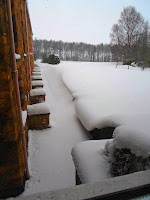Saturday, 20 October 2012
Magnificat.com
Luke
12: 8-12
MEDITATION OF
THE DAY
Acknowledging
the Son of Man
The
present state is a beginning of a martyrdom of the most pure love... You must
immerse yourself evermore in pure love, and in this divine fire you must be a
true victim sacrificed as a holocaust to the Supreme Good. Love, love, suffer,
and be silent. Love allows one to speak little, and if it be much en-kindled it
does not allow one to say anything because [the soul] attends to pure love and
allows itself to be burnt to ashes in the divine fire in which, with a glance
of charity, it embraces the needs of all creatures and without expressing it,
cries out for all.
Ah, that His
most Sacred Suffering
Could always be
in my heart!
Ever praying,
Burning love my
only part! ...
In my meditation
a fire has come forth,
It has made my
heart as unquenchable fire!
Abandon
yourself in the deep sea of divine love, entering through the door of the most
pure Heart of Jesus, in pure faith, without images. Hide yourself totally in
that great Holy of Holies, and there lose yourself completely in the bottomless
sea of the infinite Love of God. Rise to the contemplation of the divine
wonders, beauties, and riches of the Sovereign Good; take pleasure in him; melt
into that great fire like a small piece of wax; put yourself on the bundles of
spices which are the sufferings of Jesus, and there burn everything, reduce
the whole holocaustal victim to ashes.
SAINT PAUL OF THE CROSS
Saint Paul of the Cross (t 1775) was an
Italian priest, mystic, and the founder of the Passionists.
St. Paul of the Cross, Priest (1693-1775)

The eighty-one years of this Saint's life were modelled on the Passion of Jesus Christ. In his childhood, when praying in church, a heavy bench fell on his foot, but the boy took no notice of the bleeding wound, and spoke of it as "a rose sent from God." A few years later, the vision of a scourge with "love" written on its lashes assured him that his thirst for penance would be satisfied. In the hope of dying for the faith, he enlisted in a crusade against the Turks; but a voice from the Tabernacle warned him that he was to serve Christ alone, and that he should found a congregation in his honor.
At the command of his bishop he began while a layman to preach the Passion, and a series of crosses tried the reality of his vocation. All his first companions, save his brother, deserted him; the Sovereign Pontiff refused him an audience; and it was only after a delay of seventeen years that the Papal approbation was obtained, and the first house of the Passionists was opened on Monte Argentario, the spot which Our Lady had pointed out.
St. Paul chose as the badge of his Order a heart with three nails, in memory of the sufferings of Jesus, but for himself he invented a more secret and durable sign. Moved by the same holy impulse as Blessed Henry Suso, St. Jane Frances, and other Saints, he branded on his side the Holy Name, and its characters were found there after death.
His heart beat with a supernatural palpitation, which was especially vehement on Fridays, and the heat at times was so intense as to scorch his shirt in the region of his heart. Through fifty years of incessant bodily pain, and amidst all his trials, Paul read the love of Jesus everywhere, and would cry out to the flowers and grass, "Oh! be quiet, be quiet," as if they were reproaching him with ingratitude.
He died whilst the Passion was being read to him, and so passed with Jesus from the cross to glory.
Lives of the Saints, by Alban Butler, Benziger Bros. ed. [1894]
Luke 12:8-12
Knox Bible (KNOX)
8 And I tell you this; whoever acknowledges me before men, will be acknowledged by the Son of Man in the presence of God’s angels; 9 he who disowns me before men, will be disowned before God’s angels. 10 There is no one who speaks a word against the Son of Man but may find forgiveness; there will be no forgiveness for the man who blasphemes against the Holy Spirit.11 When they bring you to trial before synagogues, and magistrates, and officers, do not consider anxiously what you are to say, what defence to make or how to make it; 12 the Holy Spirit will instruct you when the time comes, what words to use.














.jpg)